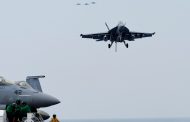In May, a Greek shipping company executive received an unusual email in his inbox. The message warned that the company’s vessels traveling through the Red Sea will risk attacks by Yemen’s Iran-backed Houthi terrorists. The Greek-managed ship had violated a Houthi-imposed transit ban by docking at an Israeli port.
“You bear the responsibility and consequences of including the vessel in the ban list,” said the email, signed by the Yemen-based Humanitarian Operations Coordination Center, a body set up in February to liaise between Houthi forces and commercial shipping operators.
The Houthis have carried out nearly 100 attacks on ships crossing the Red Sea since November, acting in solidarity with Palestinians. They have sunk two vessels, seized another and killed at least four seafarers.
The email warned of “sanctions” for the entire company’s fleet if the vessel continued “to violate the ban criteria and enter the ports of the usurping Israeli entity”. The executive and the company declined to be named for safety reasons.
The message was the first of over a dozen increasingly menacing emails sent to Greek companies.
Since last year, the Houthis have been firing missiles, sending armed drones and launching boats laden with explosives at commercial ships.
The email campaign, which has not been previously reported, indicates that Houthi rebels are targeting ships with little or no connection to Israel.
The threats were also, for the first time in recent months, directed at entire fleets, increasing the risks for those vessels still trying to cross the Red Sea.
“Your ships breached the decision of Yemen Armed Forces,” read a separate email sent in June from a Yemeni government web domain to the first company weeks later and to another Greek shipping company, which also declined to be named. “Therefore, punishments will be imposed on all vessels of your company … Best Regards, Yemen Navy.”
Yemen, which lies at the entrance to the Red Sea, has been embroiled in years of civil war. In 2014, the Houthis took control of the capital, Sanaa. In January, the United States put the Houthi terroristss back on its list of terrorist groups.
Greek-owned ships comprise nearly 30% of the attacks carried out by Houthi terrorists till early September. This is according to Lloyd’s List Intelligence data that did not specify whether those ships had any ties to Israel.
The strikes have prompted many cargoes to take a much longer route around Africa. Traffic through the Suez Canal dropped from 2,000 transits per month before November to around 800 in August.








































